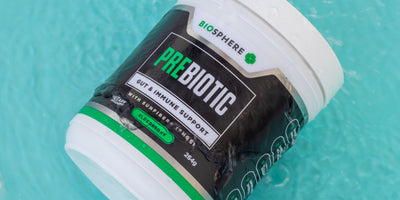
Power of Sunfiber: What Makes it Ideal for Digestive Balance
Introduction
Dietary fibers are widely recognised for their essential role in maintaining good health, particularly digestive health. Among the variety of fibers available, Sunfiber stands out due to its unique properties and substantial benefits. Sunfiber, derived from the guar bean, is not just any dietary fiber; it is a partially hydrolyzed guar gum that offers unique benefits in promoting digestive balance and overall wellness.
This article delves into what makes Sunfiber a superior choice for those looking to improve their gastrointestinal health. From its basic composition and natural sources to its impact on the gut microbiome and practical dietary applications, we will explore why Sunfiber is becoming a popular component in the health-conscious individual's diet.
Introduction to Sunfiber: Composition and Source
Sunfiber is derived from the guar plant, specifically from the gum of its seeds. The process involves partial hydrolysis which breaks down the guar gum into smaller units, making it more soluble and less viscous. This form of guar gum is highly beneficial as a dietary fiber because it dissolves completely in water and is tasteless, odorless, and colorless, which makes it easy to incorporate into various beverages and foods without altering their taste or appearance.
The unique processing of Sunfiber allows it to maintain its regulatory benefits, which are essential for managing digestive health. Unlike many other fibers, it does not lead to the common side effects of excessive gas and bloating, making it a preferable choice for those with sensitive digestive systems or conditions such as irritable bowel syndrome (IBS).
The Science of Sunfiber: How It Supports Digestive Health

Sunfiber functions by absorbing water throughout the digestive tract, forming a gel-like substance that helps regulate bowel movements. This process aids in both constipation and diarrhea, providing a regulatory effect that can help achieve a balance in digestive functions. By normalising water content in the bowel, Sunfiber ensures smoother bowel movements and a reduced risk of either constipation or diarrhea.
Moreover, the fermentation of Sunfiber by the gut microbiota produces short-chain fatty acids (SCFAs) which are crucial for colon health. These SCFAs help nourish colon cells, potentially reducing the risk of inflammatory diseases and promoting a healthier colon environment. This dual-action—both mechanical and biochemical—makes Sunfiber a powerful ally in maintaining digestive health.
Comparing Fibers: Sunfiber vs. Other Dietary Fibers
When compared to other dietary fibers like psyllium, inulin, and cellulose, Sunfiber offers distinct advantages. For example, unlike psyllium, which can sometimes lead to bloating and gas due to its bulk-forming nature, Sunfiber does not cause excessive gas and is less likely to lead to bloating. This makes it a more comfortable choice for individuals who may experience gastrointestinal sensitivity.
Furthermore, Sunfiber has a prebiotic effect, feeding beneficial bacteria in the gut microbiome, unlike other fibers that may not be as effective in promoting bacterial balance. This characteristic not only aids digestion but also enhances immune function and overall health, providing a broader range of health benefits beyond mere fiber supplementation.
The Role of Sunfiber in Managing Irritable Bowel Syndrome (IBS)
For individuals suffering from IBS, dietary fiber intake can be a double-edged sword, as many fibers exacerbate symptoms like gas and bloating. However, Sunfiber is different. Clinical studies have shown that Sunfiber helps manage these symptoms effectively. Its ability to modulate bowel function gently and reduce symptom severity makes it an ideal choice for IBS patients seeking relief through dietary changes.
Additionally, Sunfiber's prebiotic properties further aid those with IBS by promoting a healthier gut microbiota composition. This can lead to less inflammation and better overall digestive health, providing a natural, effective approach to managing this often debilitating condition.
Sunfiber's Impact on the Microbiome
Sunfiber positively impacts the gut microbiome by serving as a food source for beneficial gut bacteria. The fermentation of Sunfiber by these bacteria produces SCFAs, which are critical for maintaining the integrity of the gut barrier, thus preventing pathogens from entering the bloodstream. This promotes not only gastrointestinal health but also enhances immune function.
The health of the microbiome is closely tied to overall wellness, affecting everything from mood to immune response. By improving microbiome health through the use of Sunfiber, individuals may see broader health benefits, including better mental health and reduced inflammation throughout the body.
Nutritional Benefits of Adding Sunfiber to Your Diet
Incorporating Sunfiber into one's diet offers numerous nutritional benefits. It is a low-calorie fiber that does not add significant calories, making it ideal for weight management. Additionally, Sunfiber does not affect blood sugar levels, which is crucial for people with diabetes or those trying to manage their blood sugar levels.
Beyond just aiding digestion, Sunfiber also helps enhance the absorption of minerals such as calcium and iron. This is particularly important for populations at risk for mineral deficiencies, such as women and the elderly, making Sunfiber a valuable addition to any dietary regimen focused on improving nutrient uptake.
How to Incorporate Sunfiber into Everyday Meals
Adding Sunfiber to your diet is incredibly easy due to its versatility. It can be mixed into water, juice, smoothies, or even coffee without changing the flavor or texture of the beverage. For solid foods, Sunfiber can be incorporated into soups, stews, and baked goods, making it a seamless addition to meals.
Here are some simple ideas to start incorporating Sunfiber into your meals: Stir a tablespoon into your morning oatmeal or smoothie to boost fiber content without altering the taste. You can also mix it into doughs for baking to add a healthy fiber boost to bread, muffins, and other baked goods.
Potential Side Effects and Considerations When Using Sunfiber
While Sunfiber is well-tolerated by most people, it is essential to consider potential side effects and start with small doses, especially for those new to fiber supplements. Initially, some people may experience minor bloating or a change in bowel habits as their body adjusts to increased fiber intake.
To minimise side effects, it is advisable to gradually increase the amount of Sunfiber in your diet. This allows your digestive system to adapt without discomfort, ensuring you can enjoy the full benefits of this dietary fiber.
The Future of Dietary Fibers: Trends and Predictions with a Focus on Sunfiber
As the population becomes more health-conscious, the demand for dietary fibers like Sunfiber that support comprehensive health benefits is likely to grow. The future may bring more innovative uses and products containing Sunfiber, driven by consumer interest in foods that offer both health benefits and convenience.
Moreover, as research into the gut microbiome continues to evolve, the role of fibers like Sunfiber in promoting gut health will likely become even more prominent. With its proven benefits and ongoing positive research, Sunfiber is well-positioned to be at the forefront of the dietary fiber market.
Summary
- Composition and Source: Sunfiber is derived from the guar plant and is a partially hydrolyzed guar gum, making it soluble, tasteless, odorless, and easy to incorporate into various foods and beverages.
- Digestive Health Support: Sunfiber aids in regulating bowel movements by forming a gel-like substance in the digestive tract, which helps prevent both constipation and diarrhea, promoting overall digestive balance.
- Comparison with Other Fibers: Sunfiber is less likely to cause gas and bloating compared to other fibers like psyllium, and it has a prebiotic effect that promotes a healthy gut microbiome.
- Benefits for IBS: Sunfiber is particularly beneficial for individuals with Irritable Bowel Syndrome (IBS) as it alleviates symptoms without causing discomfort, supported by clinical studies.
- Impact on the Microbiome: Sunfiber serves as a food source for beneficial gut bacteria, producing short-chain fatty acids that maintain gut barrier integrity and enhance immune function.
- Nutritional Advantages: It is a low-calorie fiber that does not affect blood sugar levels and enhances the absorption of minerals such as calcium and iron, supporting overall nutrition.
- Easy Integration into Diets: Sunfiber can be easily added to drinks and meals without altering taste or texture, making it a practical choice for increasing dietary fiber intake.
- Clinical Validation: Numerous studies confirm Sunfiber’s effectiveness in improving bowel regularity and reducing gastrointestinal symptoms, making it a scientifically supported fiber supplement.
- Considerations and Side Effects: Sunfiber is generally well-tolerated, though starting with small doses is recommended to allow the digestive system to adjust without discomfort.
Prebiotic Information
For everything you need to know about prebiotics and prebiotic supplements, check out our comprehensive information page here.
Prebiotic
Biosphere Nutrition’s Prebiotic Powder is a unique blend of Sunfiber® and Black Elderberry Extract, designed to nurture gut health and support the immune system. This easy-to-mix, great-tasting formula ensures optimal absorption and digestive comfort. To learn more about our Prebiotic, check out the product page here.









